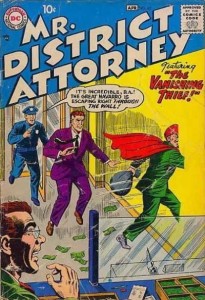December 15 marked Bill of Rights Day, and Tim Lynch rounds up ways in which most of the constituent amendments in the Bill of Rights are under pressure from government today. And in a Cato Daily Podcast, Caleb Brown interviews Georgetown Law’s Laura Donohue of Georgetown Law School on the history of general warrants, important in the development of the Fourth Amendment, which many assumed we abolished but may be making a comeback.
Posts Tagged ‘Fourth Amendment’
EEOC’s use of “administrative subpoenas”
No warrant needed: “administrative subpoenas” or “civil enforcement demands” allow the Equal Employment Opportunity Commission and other federal agencies to demand “everything from Social Security numbers to medical records without a judge’s prior approval, so long as the information is “relevant” to the agency’s work.” Courts have allowed the maneuver although it bypasses the protections of the Fourth and Fifth Amendments. [Kathryn Watson, Daily Caller]
“National Constitution Center’s ‘Interactive Constitution’”
Recommended by Eugene Volokh, the National Constitution Center’s “Interactive Constitution“. Its description:
On this site, constitutional experts interact with each other to explore the Constitution’s history and what it means today. For each provision of the Constitution, scholars of different perspectives discuss what they agree upon, and what they disagree about. These experts were selected with the guidance of leaders of two prominent constitutional law organizations — The American Constitution Society and The Federalist Society.
The writers include many familiar names and every contribution I’ve read so far, on both sides of questions, has been of high quality.
A thought on “getting guns off the streets”
“Stop and frisk” in New York City has a Right valence; “getting guns off the streets,” a Left. But what if in practice they mostly amounted to the same thing?
Police and prosecution roundup
-
 Sheriff’s group wants Facebook to ax “hate speech against police,” “anti-police rhetoric”: what could go wrong? [WDIV, Daily Caller]
Sheriff’s group wants Facebook to ax “hate speech against police,” “anti-police rhetoric”: what could go wrong? [WDIV, Daily Caller] - The “Mr. District Attorney” comic book cover at right is from Jim Dedman at Abnormal Use, who as part of his Friday links roundup for years now has featured great law-related comic book covers related to law, crime, and justice. Check out his archive;
- “Under the Microscope: The FBI Hair Cases,” on a major forensic fiasco [Al-Jazeera America documentary, auto-plays, via Scott Greenfield]
- Knock and announce: in case from Eastern Shore of Maryland, Fourth Amendment got SWATted by militarized police [Ilya Shapiro and Randal John Meyer, Newsweek and Cato]
- Of course the intersection of civil asset forfeiture with sex panic is one big disaster area for liberty [Elizabeth Nolan Brown] “Should Prostitution Be Legalized?” [David Boaz, Cato; Reason panel on “sex trafficking” goes on despite threatened activist disruptions]
- Doctrine of qualified immunity shields police officers (and other public employees) from most civil liability. How does it work? [Nathan Burney at Radley Balko]
- The U.S. Department of Justice regularly settles complaints against local police departments by extracting a promise to abide by future negotiated constraints. Federalism and constitutional concerns aside, how well do these consent decrees actually work in reforming conduct? [Marshall Project]
Republican debate observations
“Cross-examination is the greatest legal engine ever invented for the discovery of truth,” a great legal scholar once wrote. Fox News proved it — and generated a superior, entertaining debate — by aiming genuinely hard, personalized questions at the Republican front-runners. We know more now about which candidates are heedless of liberty and the U.S. Constitution, ill-prepared or inconsistent. Would that the press were this tough on all candidates.
I live-tweeted it last night and here are a few highlights, in earliest-to-latest chronological order:
Hmm. RT @cmoraff Carly Fiorina wants tech companies to be nicer to Feds who want to snoop around your data. http://t.co/ZLrdmQXvTu #cato2016
— Walter Olson (@walterolson) August 6, 2015
"The Fourth Amendment is what we fought the Revolution for." Rand Paul vs. Chris Christie, a compelling exchange. #cato2016 #gopdebate
— Walter Olson (@walterolson) August 7, 2015
.@RandPaul: We fought the American Revolution for the Fourth Amendment. Get a warrant. #Cato2016
— David Boaz (@David_Boaz) August 7, 2015
Trump made a good point about expensive, anticompetitive system of penning health insurance within state lines #cato2016 #gopdebate
— Walter Olson (@walterolson) August 7, 2015
"We need to repeal Dodd-Frank." @marcorubio, grabbing an effective @carlyfiorina theme, cites effect on small banks #cato2016 #gopdebate
— Walter Olson (@walterolson) August 7, 2015
Sorry, but @RandPaul gave a misleading account of the Houston pastors' subpoena. My 2 cents: http://t.co/iNR1u06Q3w #Cato2016 #GOPDebate
— Walter Olson (@walterolson) August 7, 2015
Contra @marcorubio & Huckabee, Antonin Scalia in 2008: "of course" Const does not ban abortion http://t.co/s4h8Yznr9C #cato2016 #GOPDebate
— Walter Olson (@walterolson) August 7, 2015
More 140-character commentary on the debates, including the one earlier this week, at this link. And more from Cato colleagues.
Want to tag “Big Brother”?
Facial recognition technology has advanced rapidly, and its integration into social media provides gee-whiz features to users as well as plenty of opportunities to marketers. It also interests government actors, who already have ways, through subpoenas and otherwise, to harvest both public and non-public information from social media providers without notice to users. [Trevor Timm, The Guardian (“Think it’s cool Facebook can auto-tag you in pics? So does the government”)]
L.A. v. Patel: law must allow hotels to contest police access to registries

In Los Angeles v. Patel, decided this morning, the Supreme Court held 5-4 with Justice Kennedy joining the four liberals that a Los Angeles law requiring hotels to give police free access to guest registries was facially in violation of the Fourth Amendment because it did not provide a way for hotels to challenge a given disclosure. Justice Sotomayor wrote the majority opinion. Cato had filed an amicus brief on behalf of the position that prevailed. Earlier here. Pictured postcard via present-day Vibe Hotel. More: Josh Gerstein, Politico; Jim Harper, Cato.
More from Conor Friedersdorf: Justice Scalia in dissent focused on the historically closely regulated nature of innkeepers, but would he feel as comfortable if technological advance turned the hotel registries into an instantly accessible government database of where all travelers are staying, a development lawyers for Los Angeles appeared to view as perfectly Constitutional?
Supreme Court and constitutional law roundup
- Polls, not chancy politics of Justice-watching, represent surest hope for gay-marriage supporters [me in New York Daily News]
- “A reasonably good week for the Fourth Amendment” [Jonathan Blanks, Cato on Rodriguez v. U.S. on prolonged traffic stops, 6-3 SCOTUS, and from the D.C. Circuit, Janice Rogers Brown’s concurrence in Gross v. U.S., on rationale for D.C.’s gun sweeps]
- David Bernstein, who has done so much to enrich our understanding of Lochner v. New York, hears from Mr. Lochner’s great-granddaughter [Volokh Conspiracy]
- Armstrong v. Exceptional Child Center: Supremacy Clause doesn’t provide implied private right of action [William Baude, SCOTUSBlog; James Beck (implication for product liability); from the losing side, Steve Vladeck/Prawfs]
- Please, SCOTUS, kill off for good the awful Calder v. Jones “effects” test for personal jurisdiction [David Post] “We’re Not in Kansas: No General Jurisdiction After Bauman” [Steven Boranian, Drug and Device Law]
- Noah Feldman, for one, isn’t buying Toobin’s latest sanctimonious swipe at Scalia [Bloomberg View]
- Usage of commas in famous first line of Pride and Prejudice can shed light on how to read Constitutional guarantee of right to keep and bear arms [Eugene Volokh]
“No-knock” raids and the Founders
Radley Balko on the aftermath of a Cambridge, Md. “no-knock” police raid gone very wrong: “if the Fourth Amendment is due to the Founders’ offense at British soldiers forcibly entering homes in daylight hours after knocking and announcing to search for contraband, it seems safe to say that the Founders would be appalled by the fact that today, dozens of times each day, heavily armed government officials break into homes, often at night, without first knocking and announcing, in order to conduct searches for contraband.” More: Adam Bates, Cato.
